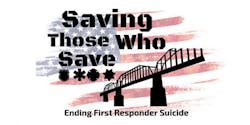TN Conference Focuses on Firefighter Suicide Prevention
Sep. 12--Area first responders are seeking ways to help not just the communities they serve but themselves by bringing attention to the issue of suicides within the profession.
A Sept. 6 conference sponsored by the Tennessee Suicide Prevention Network at Hixson United Methodist Church featured national speakers, as well as breakout sessions on specialized topics, such as how to support peers in law enforcement, assessing suicide risk in people, incorporating trauma-informed policing and how to have the difficult conversation about suicide with someone.
A main objective of the conference was to remove the stigma of talking about personal struggles in an industry that is focused on helping others first.
Stephen Kavalkovich, CEO of Rescued Consulting, shared his own story of addiction and a near-death experience because of the weight of being a first responder. Kavalkovich wrapped his identity in being a firefighter and a paramedic, thinking he was stronger than what he was seeing on a daily basis, he said.
First responders regularly see traumatic scenes, from car crashes and homicides to domestic disputes. They are dropping into people's lives to help on someone else's worst day, Kavalkovich said.
When a call comes, the responders often do not know exactly what they will be walking into at a scene. Thinking the regular exposure to trauma does not affect responders is an out-of-date mentality, he said.
"Underneath the badge, underneath the uniform, underneath everything, we are all just human and we all react the same way," Kavalkovich said.
Kavalkovich's refusal to address his problems, including addiction and divorce, sent his drug habits spiraling and cost him his job. In 2016, he overdosed on heroin shortly after he lost his paramedic license because of his drug use.
He tried rehabilitation groups, but they did not address the roots of the problem, he said.
"If you don't talk about it, the things you don't talk about will get you," he said.
A chronically stressed brain, such as one experiencing a mental illness, will shut down some brain function, especially in the parts of the brain responsible for higher-order thinking, said Eve Nite, vice chairwoman of the state Advisory Council on Suicide Prevention and director of business development at Erlanger Behavioral Health Hospital.
That is why suicide does not make sense to a healthy brain but appears to be a solution for those experiencing a mental health crisis, because they often feel they cannot be helped. Brains of people who have experienced abuse, addiction or depression all appear the same on brain scans, Nite said.
Few people in the public realize how prevalent death by suicide is, she said.
"You are now more likely to die by your own hand than in a motor vehicle accident," Nite said.
In every year for the past six years, suicides have killed more people than motor vehicle crashes, according to data from the Tennessee Suicide Prevention Network.
The total number of suicide deaths in Tennessee has nearly doubled from 1981 to 1,163 deaths in 2017. There were 68 suicide deaths in Hamilton County in 2017.
Among first responders, police officers and firefighters are more likely to die from suicide than to be killed in the line of duty, according to a study by the Ruderman Family Foundation.
But there is reason for hope, Nite said, because nine in 10 people who are suicidal can be saved if someone intervenes and connects them to resources. Deaths of despair are the most preventable form of death. Everyone has to be an advocate for themselves and others, she said.
Nite distributed copies of the Columbia Protocol, a six-question tool for determining someone's suicide risk. The questions include whether the person has wished they could go to sleep and never wake up, as well as if they have thought about how they commit suicide, for example.
For example, a person who has created a suicide plan and has to the means to do so has a 92% chance of having a lethal suicide attempt, Nite said. Questions in the Columbia Protocol help determine whether the person needs immediate crisis resources, such as inpatient care, or whether they are better served by a non-crisis resource.
This triage helps crisis centers better respond to immediate needs, Nite said.
Jim Lewis, chaplain with the Chattanooga and Dallas Bay fire departments, taught the "Question, Persuade, Refer" model of helping people who are suicidal. Most individuals who are suicidal will say or do something that should be a red flag for those around them, Lewis said.
People who are trying to help should be persistent in asking if the person is OK. Suicide is not the problem but the perceived solution to whatever problem the person is experiencing, Lewis said, so it is important to connect people with resources that can address the underlying issue.
Even telling the person struggling that you want them to live can make a big difference, Lewis said. When going through difficult times, people can be steered away from suicide through access to positive outlets, such as effective hotlines, social connections, community involvement outside of work and coping skills.
Restricting people's access to lethal means is also important, Lewis said. Firearms are the leading means of death by suicide. In 2017, guns were used in 61% of suicides, according to the Tennessee Suicide Prevention Network.
First responders should know that asking for help does not make them weak or unable to help others, Lewis said.
Contact Wyatt Massey at [email protected] or 423-757-6249. Find him on Twitter at @News4Mass
. ___ (c)2019 the Chattanooga Times/Free Press (Chattanooga, Tenn.)
Visit the Chattanooga Times/Free Press (Chattanooga, Tenn.) at www.timesfreepress.com
Distributed by Tribune Content Agency, LLC.
